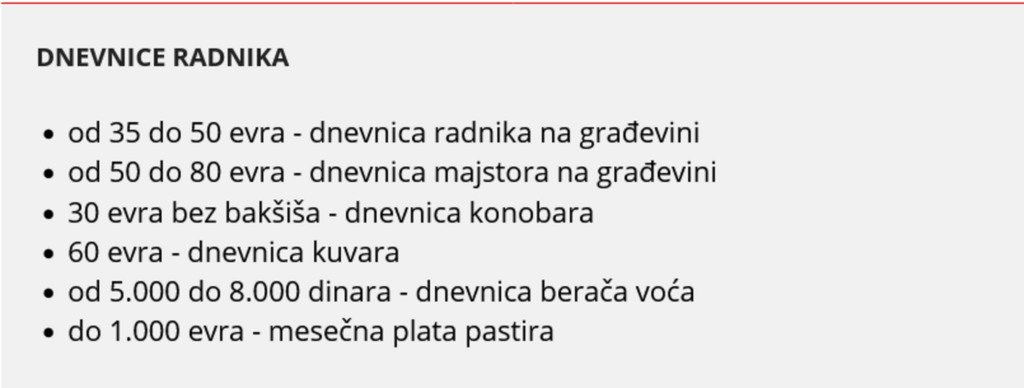
Emigration drives up wages in Balkans
On average, a master bricklayer in Serbia can earn up to 80 euros per day, while manual laborers can earn up to 50 euros. Wages are similarly high in other professions as well, and can rise further in the case of bigger projects or larger orders. Experts believe the significant improvement in salaries is due to the fact that many skilled labourers have gone abroad, allowing those who stayed behind to be way more selective.
Value of remaining workers grows
„If you aren’t willing to work for that much, someone else will come” – employees in the Balkans have heard similar responses for many years.
But in recent years, things have changed in Serbia, with employers frequently feeling the need to be more flexible in terms of working conditions and offering higher wages. This is all the result of a significant portion of the skilled labour force migrating to the west, leaving those who have stayed behind to pick and choose between assignments at will, the daily Kurir writes
„May as many people as possible go abroad; the situation and making a living isn’t any easier there, either. I am, on the other hand, better off, since I stayed here. Anyone with a problem calls me, and I can decide whether to take on the job and, if so, for how much. I live a better life, while they are stacked up in workers’ hostels in Germany,” a Serbian plumber told the V4NA news agency. He explained that he has now reached a point where does not have to work on weekends or holidays, because he earns enough money with what he makes during regular working hours.
Experts also agree that as many have gone abroad, the market value of those workers who stayed has increased significantly. Today an unskilled labourer working in the construction industry earns as much as a skilled worker used to, back in the day.
As employers in Serbia have an increasingly hard time finding employees, they are looking for workers in the broader region. It is not uncommon for people from far-away countries – including Nepal, Uzbekistan, India and Kazakhstan – to go and work in the Balkans, with Serbian companies.
There is a clear, years-long trend of growing wages in Serbia, trade union chief Ljubisav Orbovic said, adding that working conditions are also significantly better than they were a few years ago. This is true in almost every profession.

Source: Kurir
Breaking down wages by jobs, it is visible that a construction worker can make up to 50 euros a day, with masons earning as much as 80 euros per day. Waiters pocket 30 euros a day without tips, cooks and fruit pickers earn a daily 60 euros, while shepherds are paid up to a thousand euros a month.
Situation is the same in the other Balkan countries
A restaurant owner near Sarajevo, Bosnia and Herzegovina, was looking for a cook. He offered a pay equaling 2300 euros, but he did not find a suitable professional. Not a single serious applicant showed interest for the job in a period of 20 days, but the owner trusts that the position will eventually be filled. He also needed 4-5 waiters in the restaurant, situated in a ski resort, but as he did not find any, he turned the venue into a self-service restaurant.

In Croatia, hotel and restaurant owners had difficulties finding suitable employees even before the start of the touristic season. Some 35 thousand people have been missing form the sector this year alone. Locals say the problem is only partly attributable to emigration, with another factor being that the population of the country is constantly decreasing. Thus, there are practically no employable professionals, even if employers offer higher than average wages.

